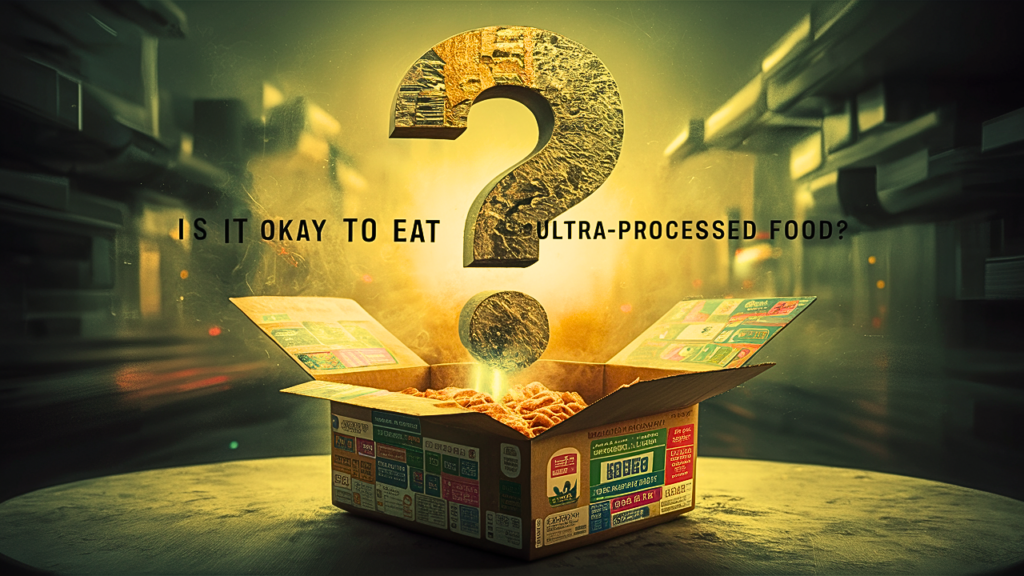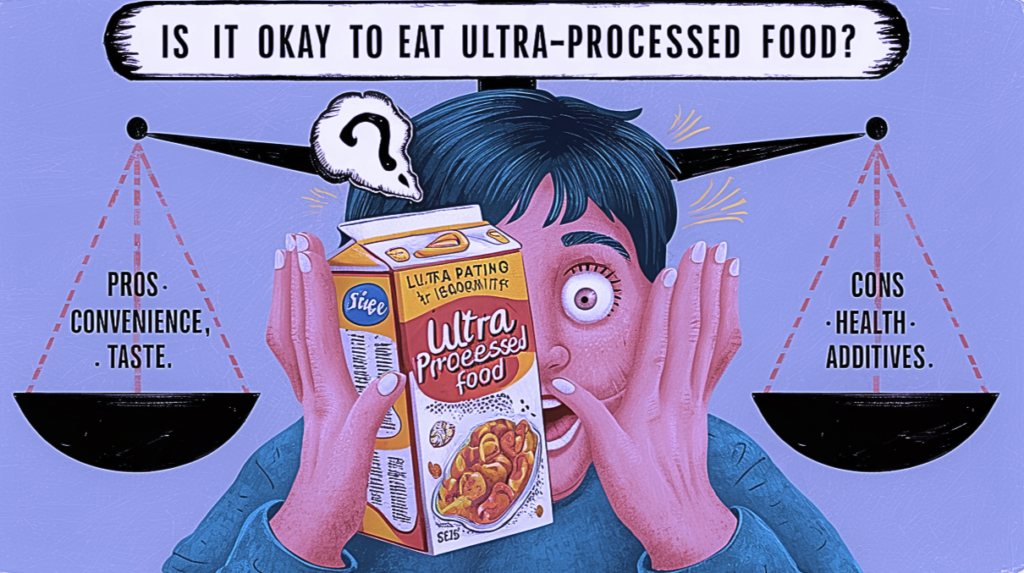Navigating the Ultra Processed Food Dilemma: Balancing Convenience and Health. Is it okay to eat ultra processed food ? Delve into the risks associated with consuming processed foods and gain insights into how they can impact your health.
In our modern, fast-paced lifestyle, convenience often takes precedence, even in our dietary choices. This is evident in the widespread availability and consumption of ultra processed foods. However, amidst their attractive packaging and appealing taste, lies a question: are these convenient options compromising our well-being? Let’s explore the complexities of ultra processed foods, weighing their advantages and disadvantages while providing guidance on how to approach them.

Image : Is it okay to eat ultra processed food ?
Table of Contents
Is it okay to eat ultra processed food ? Unveiling the Nature of Ultra-Processed Foods
Not all processed foods are equal. While some, like canned vegetables or frozen fruits, retain a significant portion of their nutritional value despite processing, ultra-processed foods undergo extensive alterations. These modifications typically involve the addition of:
1. Excessive Sugar: The incorporation of added sugars such as high-fructose corn syrup contributes to elevated calorie content, fostering weight gain and metabolic complications.
2. Unhealthy Fats: Saturated and trans fats, prevalent in fried foods and packaged snacks, elevate LDL cholesterol levels, thereby amplifying the risk of cardiovascular issues.
3. Sodium Overload: Ultra-processed foods often contain high levels of sodium, which can lead to hypertension, a significant risk factor for heart disease and stroke.
4. Assorted Additives: Preservatives, artificial colors, and flavorings are commonly utilized to enhance taste, texture, and shelf life. While deemed safe in limited quantities, their long-term effects remain under scrutiny.
Also read : Best Natural Sugar Alternatives
Is it okay to eat ultra processed food : The Hazards of Convenience: Health Implications
The abundance of added sugars, unhealthy fats, and sodium in ultra-processed foods poses various health risks:
1. Obesity and Weight Gain: The calorie density and palatability of these foods encourage overconsumption, fostering obesity and weight gain.
2. Cardiovascular Complications: The combination of unhealthy fats and sodium contributes to adverse effects on heart health, including elevated cholesterol and blood pressure levels.
3. Type 2 Diabetes: Excessive sugar consumption disrupts blood sugar regulation, potentially leading to insulin resistance and type 2 diabetes.
4. Cancer Susceptibility: Some studies suggest a correlation between frequent consumption of ultra-processed foods and an increased likelihood of certain cancers, such as colorectal cancer.
5. Digestive Disruptions: The artificial additives present in these products may adversely affect the gut microbiome, which plays a crucial role in digestion and overall health.
Also read : 10th Best Way To Weight Lose Naturally
Is it okay to eat ultra processed food : Beyond the Physical: Psychological Ramifications
The appeal of ultra-processed foods extends beyond their taste, as they are meticulously engineered to trigger dopamine release in the brain, fostering cravings and undermining portion control. Additionally, their convenience can lead to a detachment from the process of preparing and savoring whole foods.
Striking a Balance: Navigating the Realm of Processed Foods
While completely eliminating ultra-processed foods may not be feasible, adopting a balanced approach is paramount:
1. Prioritize Whole Foods: Center your diet around unprocessed or minimally processed whole foods, including fruits, vegetables, whole grains, lean proteins, and healthy fats.
2. Scrutinize Labels: Develop the habit of scrutinizing food labels, opting for products with recognizable ingredients, limited added sugars, and healthier fats.
3. Moderate Consumption: Indulge in ultra-processed foods occasionally, while structuring your meals around whole foods and integrating processed items judiciously.
4. Embrace Home Cooking: Allocate time for home-cooked meals, allowing you to exercise control over ingredients and portion sizes.
5. Explore Healthier Alternatives: Substitute sugary beverages with water or unsweetened tea, opt for baked chips over fried varieties, and choose air-popped popcorn instead of microwave options.

In Conclusion Is it okay to eat ultra processed food : Striving for Informed Dietary Choices
While ultra-processed foods offer undeniable convenience, their impact on health cannot be overlooked. By acknowledging their drawbacks and making informed decisions, individuals can navigate the dietary landscape effectively, fostering a balanced eating pattern that prioritizes both health and satisfaction. Remember, incremental changes can yield significant improvements in overall well-being. So, instead of harboring guilt, embrace the journey towards a healthier lifestyle.
FAQs :
What qualifies as ultra-processed food?
Ultra-processed foods are typically manufactured products containing artificial additives, preservatives, and refined ingredients.
Is it okay to eat ultra processed food in moderation?
While occasional consumption may not have immediate adverse effects, long-term intake of ultra-processed food can negatively impact health.
Can ultra-processed food be part of a balanced diet?
Ideally, ultra-processed foods should be limited in favor of whole, nutrient-rich foods for optimal health.
Are there any health benefits to consuming ultra-processed food?
Ultra-processed foods are often calorie-dense but nutrient-poor, offering little nutritional value compared to whole foods.
How does cooking at home compare to consuming ultra-processed food?
Cooking at home allows for greater control over ingredients and cooking methods, promoting healthier eating habits.
What are some alternatives to ultra-processed food?
Whole foods such as fruits, vegetables, whole grains, lean proteins, and healthy fats are excellent alternatives to ultra-processed options.
